|
Printables |
PowerPoints |
Online exercises |
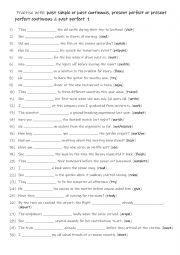
|
A2+-B1 Practise with past simple or past continuous, present perfect or present perfect continuous & past perfect 1
Students should practise past simple, past continuous, present perfect, present perfect continuous, and past perfect to communicate more precisely about different timeframes, actions, and experiences. These tenses help in narrating events, linking the past with the present, and describing ongoing actions. They improve fluency, enable clearer conver...
Level: intermediate
Age: 8-100
Type:
Downloads: 116
|
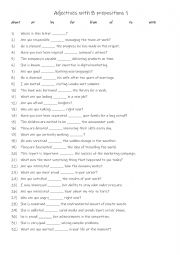
|
A2-B1 Adjectives with prepositions
Students complete the gap-fill with the correct preposition. Answers on page 2.
Level: elementary
Age: 11-100
Type: worksheet
Downloads: 110
|
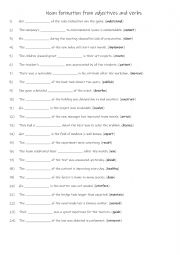
|
Word formation - noun formation from adjectives and verbs
Students read the sentence, then using the adj or verb given in () write the noun form to complete the gap-fill exercise.Answers on page 2.
Level: intermediate
Age: 10-100
Type:
Downloads: 118
|
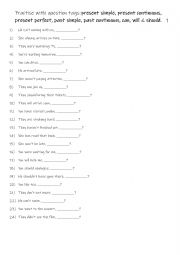
|
A2+-B1 Practise with question tags present simple, present continuous, present perfect, past simple, past continuous, can, will & should. 1
Learning question tags with various tenses (such as Present Simple, Present Continuous, Present Perfect, Past Simple, Past Continuous, Can, Will, and Should) helps students communicate more naturally and confidently in English. Question tags are used to confirm information or seek agreement, making conversations smoother and more engaging. Practici...
Level: intermediate
Age: 8-100
Type:
Downloads: 148
|
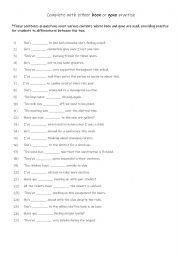
|
Complete with either been or gone practise
These sentences & questions cover various contexts where been and gone are used, providing practise for students to differentiate between the two. Students read the 27 sentences and questions to decide if the gap-fill exercise needs either been or gone to complete it. This worksheet is suitable for A2-B1 students. Answers on page 2.
Level: elementary
Age: 8-100
Type:
Downloads: 117
|
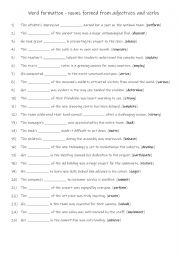
|
Word formation - nouns formed from adjectives and verbs
Vocabulary Expansion: Understanding how to form nouns from adjectives and verbs helps students build a richer vocabulary. For instance, learning that the adjective "happy" can turn into the noun "happiness," or the verb "create" can become the noun "creation," gives you more words to use and understand. Recognising patterns in word formation means ...
Level: intermediate
Age: 8-100
Type:
Downloads: 114
|
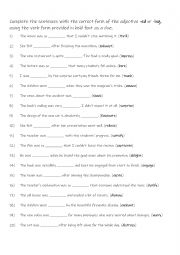
|
B1- B2 Adjective -ed or -ing practise
Students complete the sentences with the correct form of the adjective -ed or -ing, using the verb form provided in bold font as a clue. Answers on page 2.
Level: intermediate
Age: 10-100
Type:
Downloads: 116
|
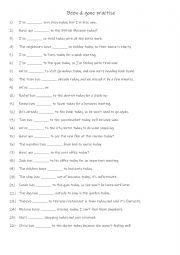
|
A2+-B1 Been & gone practise
Using "been" and "gone" properly helps students master the present perfect tense, which is essential for expressing completed actions that still impact the present.Misusing these words can lead to confusion about whether someone is still at a place or has already returned, so learning the difference is essential for clear communication. Each word i...
Level: intermediate
Age: 9-100
Type:
Downloads: 110
|
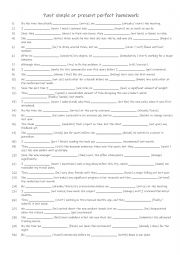
|
B1-B2 Past simple v present perfect
Understanding these tenses improves students� ability to interpret and respond to conversations and texts that involve past and present actions. It aids in following narratives and discussions more effectively.Mastery of these tenses allows learners to speak and write with greater accuracy and fluency. They can more precisely communicate differen...
Level: intermediate
Age: 10-100
Type:
Downloads: 117
|
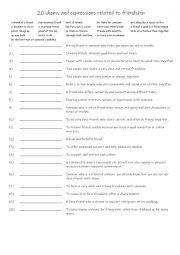
|
B2-C1 20 idioms and expressions related to friendship
First, students need to familiarise themselves with the 20 idioms and expressions and their meanings. Then they read the definitions to see which one is being described and write that word in the space provided Answers on page 2.
Level: advanced
Age: 13-100
Type:
Downloads: 108
|
|
|
|
|












